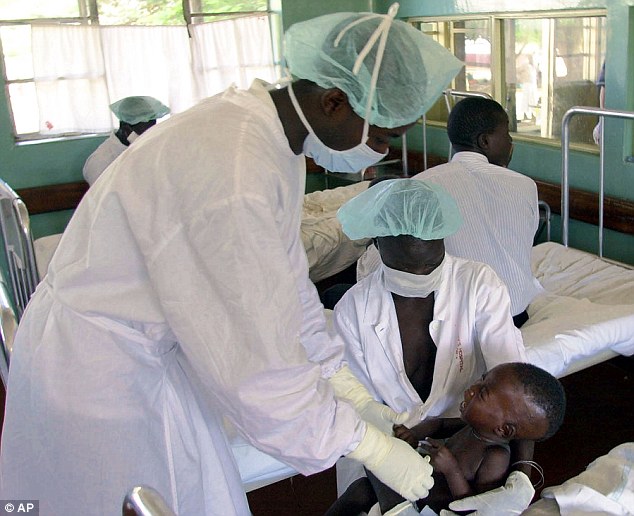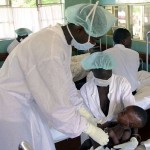Health
Ebola serum for Africa patients within weeks, says WHO

Serum made from the blood of recovered Ebola patients could be available within weeks in Liberia, one of the country’s worst hit by the virus, says the World Health Organization.
Speaking in Geneva, Dr Marie Paule Kieny said work was also advancing quickly to get drugs and a vaccine ready for January 2015.
The Ebola outbreak has already killed more than 4,500 people.
Most of the deaths have been in Guinea, Liberia and Sierra Leone.
Dr Kieny, WHO assistant director general for health system and innovation, said: “There are partnerships which are starting to be put in place to have capacity in the three countries to safely extract plasma and make preparation that can be used for the treatment of infective patients.
“The partnership which is moving the quickest will be in Liberia where we hope that in the coming weeks there will be facilities set up to collect the blood, treat the blood and be able to process it for use.”
It is still unclear how much will become available and whether it could meet demand.
NBC freelance cameraman Ashoka Mukpo – who contracted Ebola in West Africa – is declared free of the virus and will leave hospital in the US state of Nebraska
Riots break out in Sierra Leone’s diamond-rich Kono district after angry youths resisted efforts to “quarantine” a house where a 90-year-old woman suspected to have Ebola lived. The youths were said to be angry because there were no treatment centres in Kono, the BBC’s Umaru Fofana says. Police imposed a daytime curfew in the area
UK International Development Secretary Justine Greening visits Sierra Leone to assess the impact of the government’s $200m (£125m) aid package
The US Homeland Security Department says all visitors arriving from Liberia, Guinea and Sierra Leone will undergo enhanced screening at one of five airports
The Dominican Republic joins a group of Caribbean countries that have banned visitors from the three West African nations
Serum
If a person has successfully fought off the infection, it means their body has learned how to combat the virus and they will have antibodies in their blood that can attack Ebola.
Doctors can then take a sample of their blood and turn it into serum – by removing the red blood cells but keeping the important antibodies – which can be used to treat other patients.
The Spanish nurse who became the first person to contract Ebola outside West Africa tested negative for the virus after reportedly receiving human serum containing antibodies from Ebola survivors.
Dr Kieny said the treatment was not without risks, and WHO has already issued guidelines to ensure safety. Any donor blood will need to be screened for infections such a hepatitis and HIV, for example.

Health
Azerbaijan urged to help improve capacity of Afghan health workers

Acting Minister of Public Health Qalandar Ebad, in a meeting with Azerbaijan’s ambassador, Ilham Mohammadov, called for the country’s assistance in improving the capacity of Afghanistan’s health workers.
The two sides also discussed cooperation in the health sector, capacity building of Afghan health workers, and Azerbaijan’s role in the health sector and other issues, according to a statement released by the Public Health Ministry.
Azerbaijan’s envoy said that his country seeks to cooperate with Afghanistan in a sustainable manner in the field of health.
In other news, the foundation stone for the construction of oxygen production facility was laid at the Indira Gandhi children hospital in Kabul.
Officials of the Ministry of Public Health said that the facility will be built with the financial and technical assistance of the World Health Organization, and with the capacity to produce 200 cylinders of oxygen daily to meet not only the needs of the hospital, but also other health facilities.
Health
Balkh health officials report sharp increase in number of cancer patients

Balkh Public Health Department officials say there has been a significant increase in the number of patients with cancer in the province.
“In 1401, about 2,613 OPD (out patient department) cases were registered with us. In 1402, these figures were 4,912 cases,” said Ehsanullah Kaliwal, the head of the oncology department at Balkh Regional Hospital.
Some doctors say genetic factors, environmental pollution, arbitrary use of medicines, and excessive consumption of meat were reasons for the sharp increase.
One doctor said cancer was also hereditry.
However, a large percentage of cancer patients in Balkh have stomach cancer. Many of them have appealed for the government to improve treatment facilities.
According to health officials, in the first month of this solar year (April), 423 cancer patients visited this hospital for treatment.
Health
Majority of Afghans with mental disorders are women: officials

Based on last year’s data, 52 percent of people with mental disorders in Afghanistan are women, the Ministry of Public Health said.
However, after the Islamic Emirate took over the country and with the improvement of nationwide security and the provision of better health services, mental disorders have decreased, the ministry said.
“Overall, the mental security of men and women in Afghanistan is not ensured and their mental security is disturbed. According to the figures shared with us, in 2023, 52 percent of the visitors for mental disorders were women,” said Sharaft Zaman Amarkhil, the spokesperson of the Ministry of Public Health.
“Generally speaking, we can say that compared to the past, the instances of mental illnesses have decreased,” he added.
People suffering mental disorders mostly refuse to share their problem, willingly or unwillingly.
“There are many problems at home; We are poor. I finished school, but didn’t find any job,” Ansar, a mentally ill person, said.
According to the World Health Organization (WHO), half of Afghanistan’s population suffers from mental distress.
Factors such as unemployment, poverty, domestic violence, ban on girls’ and women’s education and work, and drugs are said to be key contributors to mental distress.
-

 Sport5 days ago
Sport5 days agoAfghanistan Champions League kicks off with grand opening ceremony
-

 Latest News4 days ago
Latest News4 days agoPakistan’s frontiers minister stresses ‘dignified’ return of Afghan refugees
-

 Latest News5 days ago
Latest News5 days agoMore than 800 Afghan refugees deported from Pakistan in two days
-

 Regional3 days ago
Regional3 days agoIranian president lands in Pakistan for three-day visit to mend ties
-

 Climate Change4 days ago
Climate Change4 days agoMassive river flooding expected in China, threatening millions
-

 Latest News4 days ago
Latest News4 days agoChinese keen to invest in Panjshir-Kabul water conduit project
-

 World4 days ago
World4 days agoTwo Japan navy helicopters crash, one body found, 7 missing
-

 Latest News2 days ago
Latest News2 days agoRashid Khan named AWCC’s brand ambassador

















